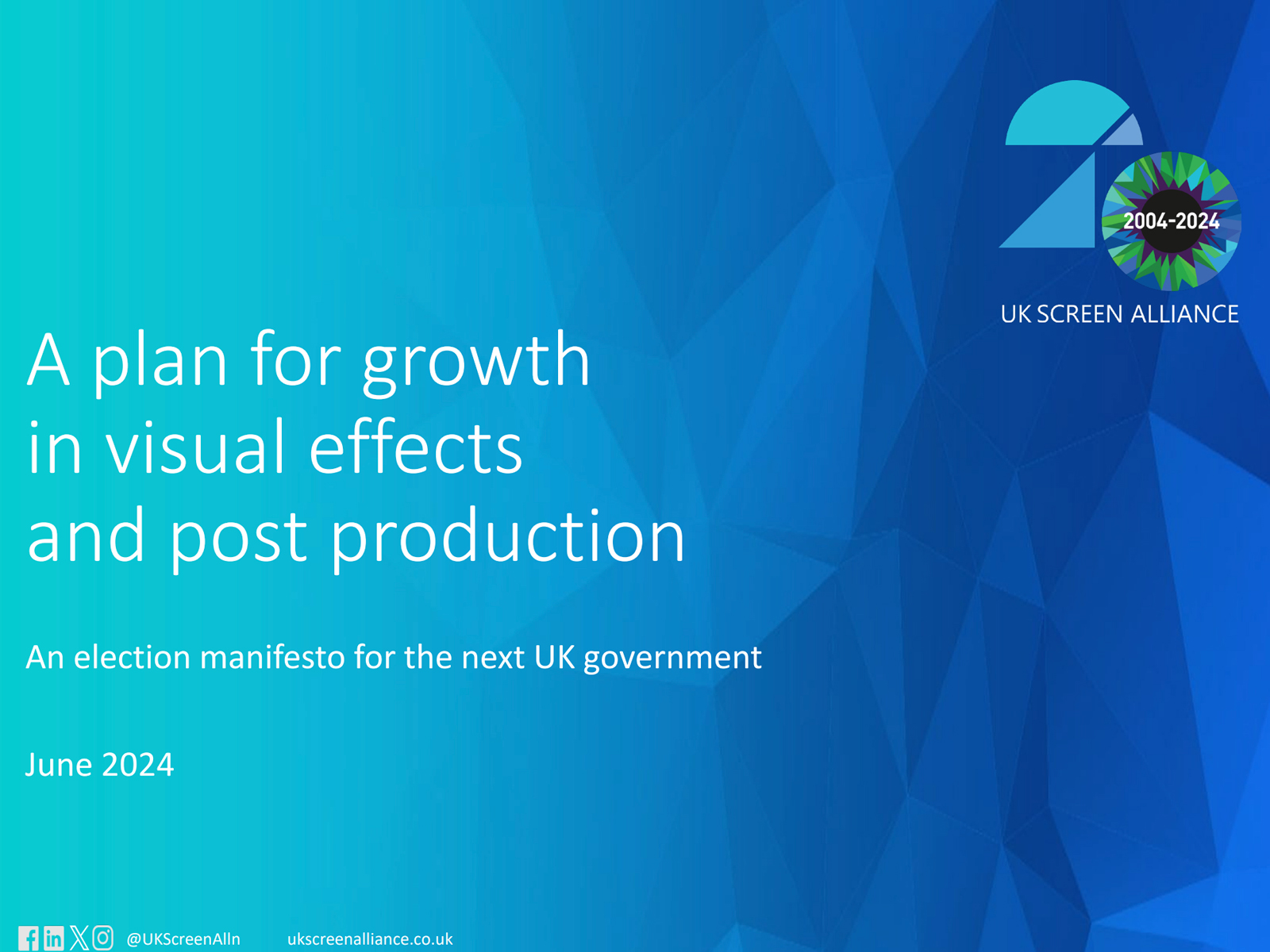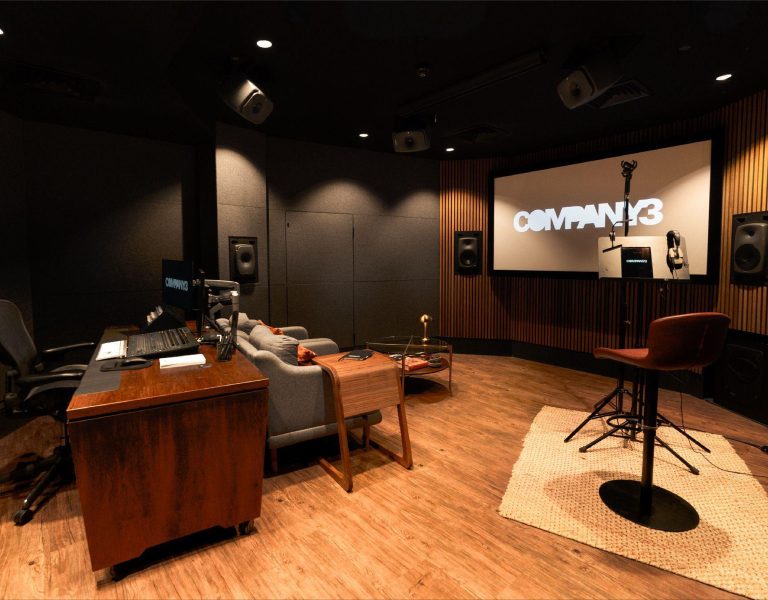
UK Screen Alliance is the trade association that represents Visual Effects (VFX), TV & Film Studios, Post Production and Animation in the UK. It is the membership organisation for over 190 leading employers in this sector, and its primary purpose is advocacy for its member companies and the wider screen industries.
UK Screen Alliance was formed in 2016 when two long-established organisations, the UK Screen Association, (founded in 2004 and celebrating its 20th anniversary this year) and Animation UK (founded in 2011) joined together to pursue mutually agreed goals on behalf of their members. The UK Screen Association members came from a lateral layer of service providers to the film, TV, and commercials sectors, whereas the Animation UK membership consists of an industry vertical, comprising independent entertainment companies specialising in the production, distribution, development, financing, and brand development of animated content. These two constituencies intersect across many common interests, such as workforce, skills development, business support, and the screen sector tax reliefs.
Introduction and context
The general election will be held on July 4th 2024 and the UK Screen Alliance has set out a manifesto for the policies that it wants to see the next government pursue.
Animation UK, which is part of the UK Screen Alliance, has also produced a separate manifesto, which we support.
Visual effects and post production companies in the UK turnover more than £1.3bn and employ in excess of 12,000 people1.
Post production covers editing, colour grading, audio dubbing, picture finishing, and film processing, but the largest part of post production is visual effects (VFX), which very often is considered as a sector in its own right.
VFX is the process where images from one or more live-action shots or CGI elements are combined to produce a convincing composite shot. In some cases, the entire shot will be digitally generated. VFX is not just about creating digital fantasy creatures, spaceships, or apocryphal events. Less visible examples of VFX work include facial replacements for stunt doubles, digital aging or de-aging of cast members, and digital augmentation of the physical scenery, with skylines and buildings which fit the era in which the film is set. Film and HETV at every level now use VFX extensively. In a blockbuster film more than 80% of the film may be touched by VFX, making it the largest line item in the budget.
Within the £4.2bn of spending supported by the UK’s four film and TV tax incentives, VFX accounts for £363.5m (8.5%)2. In addition, there is £346.5m of spending on VFX for non-tax relief supported genres such as advertising. In total VFX contributes £1.6bn in GVA to the UK economy each year.
Summary
Screen Alliance ask the next government to…
- Enact the VFX tax credit uplift proposed in the Spring Budget 2024
- Remove the Generative AI exclusion from the VFX tax credit proposal
- Bring forward the implementation date for the VFX tax credit to 1st Jan 2025
- Introduce an exclusion for VFX costs from the 80% cap on eligible expenditure in the new Independent Film Tax Credit
- Secure the future of the NextGen/AIM level 3 Extended Diploma in Games, Animation and Visual Effects Skills
- Further increase the flexibility of T Levels placements to allow more employers to offer them
- Reform the Apprenticeship Levy to cover employers’ running costs for providing placements and to fund other forms of training
- Fund further waves of skills bootcamps in the creative sector and reduce bureaucracy and delay in the bidding process
- Introduce workplace exchange programmes to increase the quality of teaching at all levels of education by providing tutors with real experience of current working practices and incentivise industry professional to become part-time tutors.
- Remove the Immigration Skills Charge from Skilled Worker Visas in priority sectors
- Retain the Graduate Visa route and continue access to the Creative Visa for workers employed by VFX companies Refrain from capping cap overall visa levels
- Prevent Channel 4 from operating their own in-house post production services
- Review the contractual terms offered to post production and VFX suppliers by independent producers, who have been commissioned by the regulated broadcasters, to foster a more stable investment environment for supply chain employers with fairer commercial practices
Screen sector tax reliefs
The screen sector tax reliefs have been vital and successful in growing the UK’s film and television industries, particularly through inward investment. The next government should continue the commitment to support these reliefs and enact the proposals put forward in the 2024 Spring Budget for increased tax relief for Visual Effects (VFX) .
The removal of the 80% cap on qualifying expenditure in respect of VFX costs only, is particularly necessary to retain VFX work and investment in the UK, and without it an estimated £350million of VFX work per year on British qualifying films will continue to be taken out of the UK. Combined with the proposed increased rate of relief to 29.25% net for the VFX spend, these two measures will incentivize an additional £175 million of inward investment and create over 2,000 new jobs, but we ask the next government to consider increasing the rate to 32%, which would be more optimally comparable with international competitor territories and stimulate further growth in the UK.
We ask that the next government does not introduce an exclusion for the costs of
Generative AI from the VFX relief as proposed in the recent HMT consultation. This would reduce competitiveness, undoing many of the advantages of the new VFX uplift, as the UK would be the only country in the world to exclude Generative AI from its tax credit. It would drive work abroad and cost British jobs rather than creating them.
The next government should advance the implementation date for the VFX uplift to 1st Jan 2025 rather than April 2025. This would avoid customers delaying spending to claim the relief, at a time when VFX companies’ cashflow is stretched because of the aftermath of the US actors’ strike.
The next government should introduce an exclusion for VFX costs from the 80% cap in the new Independent Film Tax Credit, allowing limited budget films to keep their VFX in the UK rather than seeking tax credits in overseas territories. This will particularly help smaller VFX companies and those situated in the regions and nations.
Education and skills
The vocational educational and skills system is often touted as being employer-focussed, although the low take-up of apprenticeships, bootcamps and traineeships have shown that the system often does not meet employer needs or expectations. The next government must truly heed the voices of employers and be prepared to make significant changes so that the system can be made fit for purpose.
The defunding of Level 3, 16-18 courses in England, which are not TLevels or A-Levels, threatens to disrupt the skills pipeline for VFX which has been successful over many years due to exemplary levels of employer engagement. We ask that the next government, on dayone in office, halts the Level 3 defunding programme, and commits to continued funding for the AIM Extended Diploma in Games, Animation and Visual Effects Skills, which has been designed and supported by industry through the NextGen Skills Academy network of FE colleges,
While we support the principle of work experience as required by TLevels, there are significant practical barriers to successfully implementing the policy. The next government should consider further flexibilities for placements, and meaningful incentives for employers to provide them. They should also recognise the need to retain level 3 qualifications, which do not require placements, to allow students to study screen-related subjects in regions where there are insufficient employers able to offer the number of placements needed to ensure a viable cohort.
The NextGen Skills Academy was created in 2014 by a group of forward-thinking employers who were critical of the relevance of many creative media courses in HE and FE, which lacked the right combination of industry practice and essential skills such as maths, programming, and art. Together with AIM Qualifications, they created a publicly funded Level-3 Extended Diploma in Games Animation and Visual Effects Skills. The NextGen Skills Academy was set up to provide affiliated FE colleges with a package of industry support for their teaching of this course. It is a prime example of employers taking the initiative and investing in the development of their future talent. In many ways it was a forerunner of a T-Level, albeit with exemplary levels of employer engagement instead of employer placements.
Currently there are 650 students enrolled on the NextGen/AIM course in 15 FE colleges across England. Recent expansion includes a new cohort of 120 learners across 3 FE colleges in Northern Ireland, where the NextGen/AIM course has been identified by Northern Ireland Screen as a key element in enabling growth for screen industries in their area.
The NextGen/AIM course has been able to support progression to successful outcomes. 67% of alumni go on to Higher Education, where 93% study Games, Animation or VFX degrees. 13% progress directly into work or higher apprenticeships, and this percentage would increase if companies we are able to make more apprenticeship places available. Almost half of the successful applicants for VFX apprenticeships are NextGen alumni.
To say that the NextGen/AIM course is the cornerstone of our skills pipeline is an understatement. To lose it would set us back years, at a time when we are poised to grow the economy and create highly-skilled and highly-productive jobs throughout the UK. It is vital that this course survives the Level 3 defunding programme.
The apprenticeship levy system should be reformed to allow more flexible use of employer contributions. While the VFX and post production industry are well placed with their high proportion of PAYE employment, to use apprenticeships in their current form, take up has been limited due to the burdensome costs of administration and internal support for apprentices. The 20% off-the job training requirement is also seen as a barrier, when few external providers can match the quality of training delivered in-house. The next government should allow companies to cover internal admin and support costs from the levy and allow a proportion of the levy to be used for accredited short course training.
The quality and relevance of teaching in vocational subjects at all levels of education, often falls short of employer expectations. The next government should introduce a work experience scheme for tutors to allow them to teach technical working practices with confidence. Employers are willing to offer tutor placements, but funding is needed in education to backfill for tutors while they are away on extended work experience. Conversely, industry professionals should be offered funded bootcamp training to allow them to teach in education. Employers should be compensated by colleges for the time an employee is teaching, and funding would be required to bridge the gap between tutor salaries and industry wage levels.
Skills bootcamps have considerable potential to offer targeted training. The next government should ensure that the creative industries remain a priority sector for bootcamp funding, and that new waves of funding are made available both nationally and locally. Bureaucracy in the tendering process should be reduced to allow more small niche trainers to apply for funding. There should be a more agile process which eliminates many unnecessary layers of DfE and inter-departmental sign-off, to more allow rapid deployment and tighter matching of demand, thereby ensuring more good outcomes.
The next government should continue to fund and expand the Creative Careers Programme, to raise awareness of rewarding careers in the creative industries.
Access to international talent
The VFX industry is committed to building a home-grown workforce, but in a competitive global market, it is vital that we can continue to attract the best international talent to the UK to compete at the highest levels. This not only includes established talent but also emerging talent from Europe.
The up-front cost of a Skilled Worker Visa has risen sharply and is now unnecessarily prohibitive, with the £38,700 minimum salary threshold providing an excessive brake on immigration. The next government should abolish the Immigration Skills Charge for priority sectors, as there is no evidence that the money raised is used to boost home-grown skills, or that it is deployed to support training in the sector which paid it.
The next government should retain the Graduate Visa, as recommended by the MAC, and ensure that the VFX and post production continues to be able to access the Creative Visa route.
The next government should not introduce a cap on the number of visas issued. In industries like VFX, where companies must quickly crew up to meet the demands of project-based production, this will cause severe problems if skilled labour cannot be brought in from overseas because the visa cap has been exceeded. It will result in companies simply having to turn work away as they will not have sufficient people to service it.
The next government should not re-introduce the Resident Labour Market Test for any work visa. This was shown to be ineffective and simply slowed down the application process reducing the agility of employers to respond to peaks in demand.
The best way to reduce skilled immigration is to ensure that we have a high-quality reliable education pipeline that deliver the skills that employers need from the domestic population.
Public Service Broadcasting
The last year has seen a slowdown in production, partly caused by the cost-of-living crisis affecting the spending power of consumers. This has led to a fall in advertising revenue for broadcasters who have commissioned fewer programmes. The BBC received a below inflation increase in their licence fee, and Channel 4 have been distracted by attempts to privatise them. With fewer commissions, independent producers are having a tough time, but this extends to their suppliers, like post production, who need consistent revenue to finance their long-term investment in infrastructure and the skilled workforce necessary to support these productions.
The Media Bill, which passed into law in the pre-election wash-up, like its predecessor, The Communications Act, recognises the importance of independent producers to the strength of the UK’s TV industry. However, neither document recognises the value of the deeper supply chain, like post production companies, to that success. The Media Bill gives Channel 4 the ability, for the first time, to make its own programmes. This will undoubtably have a negative impact on independent production. Similarly, should Channel 4 decide to open in-house post production facilities to service its own productions, or to service external productions, whether or not the programmes are for Channel 4, this would have a devastating effect on existing post production houses. The next government should legislate to mitigate against this undesirable scenario.
Stop-start commissioning, late decision-making, late-payments, cancellations and postponements without consequence, even in the best of times, combine to create a difficult environment for confident investment by suppliers at all levels of the value chain.
Coping with last-minute changes and additional demands, often un-budgeted, puts considerable financial strains on suppliers, as well as heaping pressure on the workforce, leading to mental-stress and burnout.
The next government should commission a review of the contractual terms offered to post production and VFX suppliers by independent producers, who have been commissioned by the regulated broadcasters, with a view to establishing a code of practice to foster a more stable investment environment for supply chain employers with fairer commercial practices.












